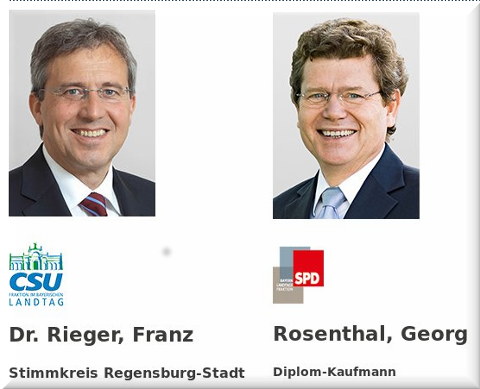

The motion concerning the situation at the EPO which was proposed by the Freie Wähler group in the Bavarian Landtag was debated at the 54th session of the the European and Regional Affair Committee which took place on Tuesday, the 21st of February, 2017.
"The session which was open to the public was chaired by Dr. Franz Rieger (CSU) and co-chaired by Georg Rosenthal (SPD)."The debate on the EPO motion was preceded by an informal briefing ("Informationsgespräch") about EU matters by two representatives of the EU, Richard Kühnel and Tobias Winkler which kicked off at 12:30. Kühnel is a former Austrian diplomat and the EU Commission's Head of Representation in Germany.
Winkler is head of the Information Office of the European Parliament in Munich which by a curious coincidence is housed on the ground floor of the EPO's Isar Building at Bob-van-Benthem-Platz.
During the information briefing with the EU officials, EPO problems already started to rear their ugly head when one of the Freie Wähler group, Dr. Hans Jürgen Fahn, referred to the EPO motion which was scheduled for discussion later in the afternoon.
"Winkler is head of the Information Office of the European Parliament in Munich which by a curious coincidence is housed on the ground floor of the EPO's Isar Building at Bob-van-Benthem-Platz."Dr. Fahn asked Mr. Kühnel to explain the position of the EU Commission in relation to the situation at the EPO. He noted that the EU Commission had observer status on the Administrative Council. He also referred to the fact that an MEP from the Freie Wähler, Ms. Ulrike Müller, had submitted a question to the EU Commission and had received a rather vague answer which left nobody any the wiser about where the Commission stood and what, if anything, it intended to do about the problems at the EPO.
When grappling with Dr. Fahn's question, the normally eloquent Mr. Kühnel appeared to be stuck for words and seemed visibly uncomfortable. He attempted to wriggle his way out of the awkward situation by referring to the fact that EU Commission only had observer status on the Administrative Council and didn't have any vote. Although technically correct, his answer is disingenuous because if the EU member states (27 or 28 depending on whether the UK is included ...) agreed to take a common line on EPO matters then they would command almost 75% of the votes on the Administrative Council.
"When grappling with Dr. Fahn's question, the normally eloquent Mr. Kühnel appeared to be stuck for words and seemed visibly uncomfortable."After the information briefing on EU matters concluded there was a brief discussion about a number of other items on the agenda relating to local Bavarian issues.
Shortly after 14:00 the debate on the EPO motion was opened. The motion was introduced by Gabi Schmidt (Freie Wähler) who noted that nothing had really changed since the last time the Landtag had discussed the situation at the EPO in June 2016.
The Freie Wähler were ably supported by the Green Party represented by Christine Kamm.
"Some observers had the impression that he was just parroting off a script that had been drafted for him by Battistelli's legal wizards and witches in the DG5 propaganda department."The motion was opposed by Mr. Walter Taubeneder, the rapporteur for the majority CSU. Mr. Taubeneder went through a list of points including the recent judgment from the Dutch Supreme Court and recent decisions from the ILOAT and somehow managed to conclude from all this that everything was rosy at the EPO and that Mr. Battistelli was doing a fine job and that EPO staff had no valid reasons for complaining about anything. Some observers had the impression that he was just parroting off a script that had been drafted for him by Battistelli's legal wizards and witches in the DG5 propaganda department.
The second largest party in the Landtag, the SPD, was strangely quiet during the debate and did not attempt to make any contribution.
Susann Biedefeld who had made a spirited speech during the previous debate in June 2016 seemed to be absent and was sadly missed.
Some people were wondering whether or not the local Bavarian SPD had received orders from the party headquarters in Berlin to keep out of the debate.
"Some people were wondering whether or not the local Bavarian SPD had received orders from the party headquarters in Berlin to keep out of the debate."Despite the lack of any contribution from the SPD, towards the end of the debate, the SPD vice-chairman of the committee Georg Rosenthal made a short statement indicating that his party would support the motion.
The chairman of the committee, Dr. Franz Rieger (CSU), closed the debate by noting that the majority CSU did not support the motion resulting in its rejection.
Although the motion failed to secure majority backing at the committee stage, the story doesn't end here because the matter will now go forward for discussion in a plenary session of the Landtag estimated to take place in about six to eight weeks time.
"But whatever the final outcome may be, Gabi Schmidt and her parliamentary colleages from the Freie Wähler and Christine Kamm from the Green Party deserve praise for their persistence in refusing to let the matter rest."Unless the CSU decides to change course in the meantime, it is very likely that the motion will be defeated when it is put to a vote in front of the Landtag as already happened once before in June last year.
But whatever the final outcome may be, Gabi Schmidt and her parliamentary colleages from the Freie Wähler and Christine Kamm from the Green Party deserve praise for their persistence in refusing to let the matter rest. ⬆